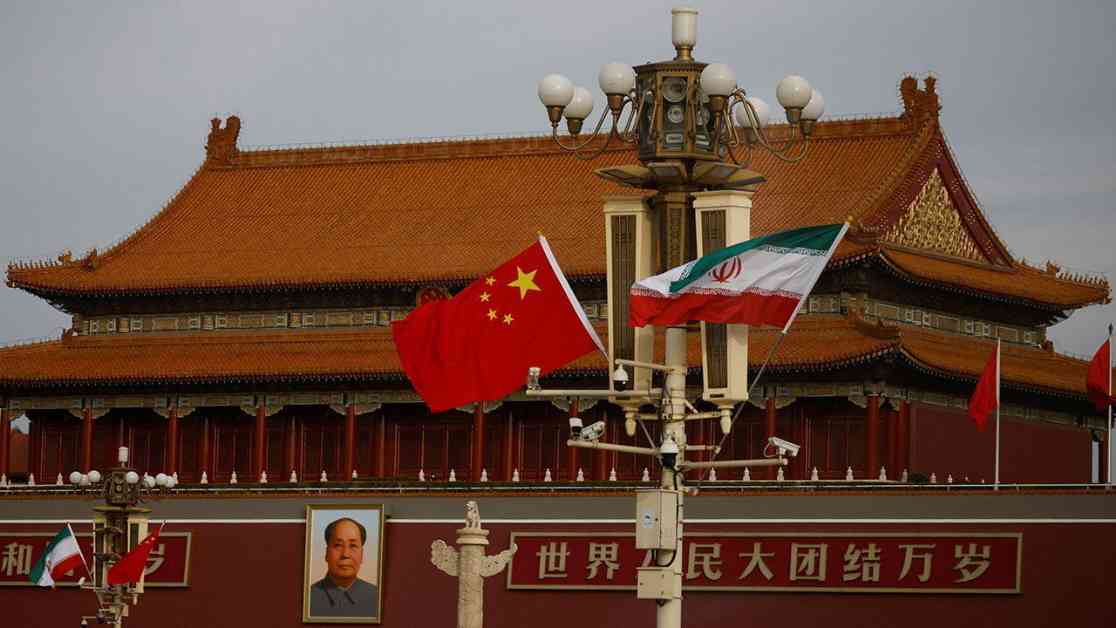China’s Unlikely Restraint on Iran: Implications and Analysis
In a world where geopolitics often dictate alliances and actions, China’s handling of its relationship with Iran has raised eyebrows and sparked debates among global analysts. Despite shared economic interests and historical ties, China’s approach to Iran has been characterized by caution and restraint, leading many to question the underlying motives behind Beijing’s seemingly tepid response to Iranian aggression in the Middle East.
The latest incidents involving Iranian-backed Houthi rebels in Yemen and Israel’s strike on the Iranian consulate in Syria have brought China’s stance on Iran under the spotlight. When the Houthi rebels targeted commercial ships in the Red Sea earlier this year, the United States turned to China for assistance. American officials reportedly urged their Chinese counterparts to use their influence to persuade Iran to rein in the Houthi rebels. Similarly, after Israel’s strike on the Iranian consulate in Syria, the U.S. once again sought China’s intervention to prevent Iran from retaliating.
The Complex Dynamics of China-Iran Relations
The dynamics of China’s relationship with Iran are complex and multifaceted. On one hand, China and Iran share a history of diplomatic relations dating back to ancient times. The Silk Road served as a conduit for cultural exchange and trade between the two nations, laying the foundation for a relationship that has endured through the centuries. Today, China views Iran as a key player in the Middle East and a valuable partner in its Belt and Road Initiative, which seeks to enhance connectivity and cooperation across Eurasia.
However, China’s ties with Iran are not without challenges. The Iranian regime’s support for militant groups and its controversial nuclear program have raised concerns among the international community, including China’s traditional allies in the West. Beijing’s delicate balancing act between maintaining its strategic partnership with Iran and upholding its commitments to global stability has often put China in a difficult position, forcing it to navigate the complexities of Middle Eastern politics with caution and pragmatism.
China’s Strategic Calculations and National Interests
At the heart of China’s approach to Iran lies a calculation of its strategic interests and national security concerns. As the world’s second-largest economy and a rising global power, China is keen to safeguard its economic investments and energy resources in the Middle East, where Iran plays a pivotal role as a major oil supplier. Beijing’s reliance on Iranian oil and its growing presence in the region through infrastructure projects and investments have reinforced the importance of maintaining stable relations with Tehran.
Moreover, China’s broader geopolitical ambitions, including its quest for regional influence and global leadership, necessitate a nuanced approach to its engagement with Iran. By treading carefully in its dealings with Tehran, Beijing seeks to avoid being drawn into the regional conflicts and power struggles that have plagued the Middle East for decades. China’s emphasis on non-interference in the internal affairs of other countries and its commitment to a multipolar world order have shaped its policy towards Iran, emphasizing dialogue and diplomacy over confrontation and coercion.
The Implications of China’s Restraint on Iran
The implications of China’s restraint on Iran are far-reaching and extend beyond the immediate context of regional conflicts and security threats. By refraining from taking a more assertive stance on Iranian provocations, China risks being perceived as a passive bystander in the face of aggression and destabilization in the Middle East. This could undermine Beijing’s credibility as a responsible global actor and erode its influence in key international forums where China seeks to shape global governance and security agendas.
Furthermore, China’s reluctance to exert pressure on Iran to curb its support for militant groups and its nuclear ambitions could embolden Tehran to pursue a more confrontational and assertive foreign policy, potentially escalating tensions and triggering a wider conflict in the region. The lack of Chinese intervention in the Yemeni crisis and the Syrian conflict has raised doubts about Beijing’s commitment to upholding international norms and principles, leading to calls for greater Chinese involvement in resolving regional disputes and promoting peace and stability.
In conclusion, China’s unlikely restraint on Iran reflects a delicate balancing act between strategic interests, national security concerns, and global ambitions. As Beijing navigates the complexities of its relationship with Tehran, it must carefully weigh the implications of its actions and prioritize stability, cooperation, and dialogue in addressing the challenges posed by Iranian aggression in the Middle East. By engaging with Iran in a constructive and proactive manner, China can play a constructive role in defusing tensions, promoting regional security, and upholding the principles of peace and cooperation in the volatile Middle Eastern region.



























